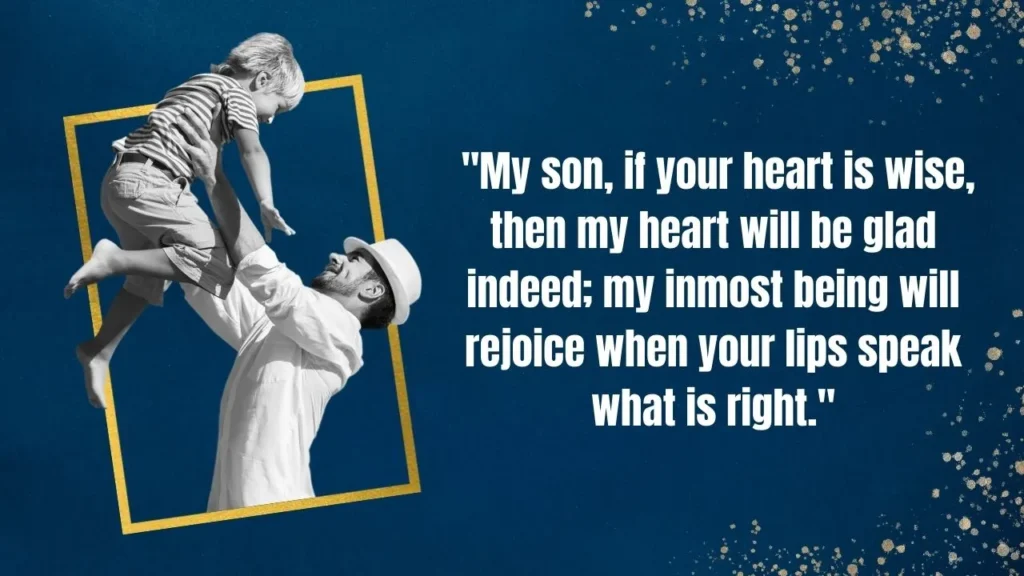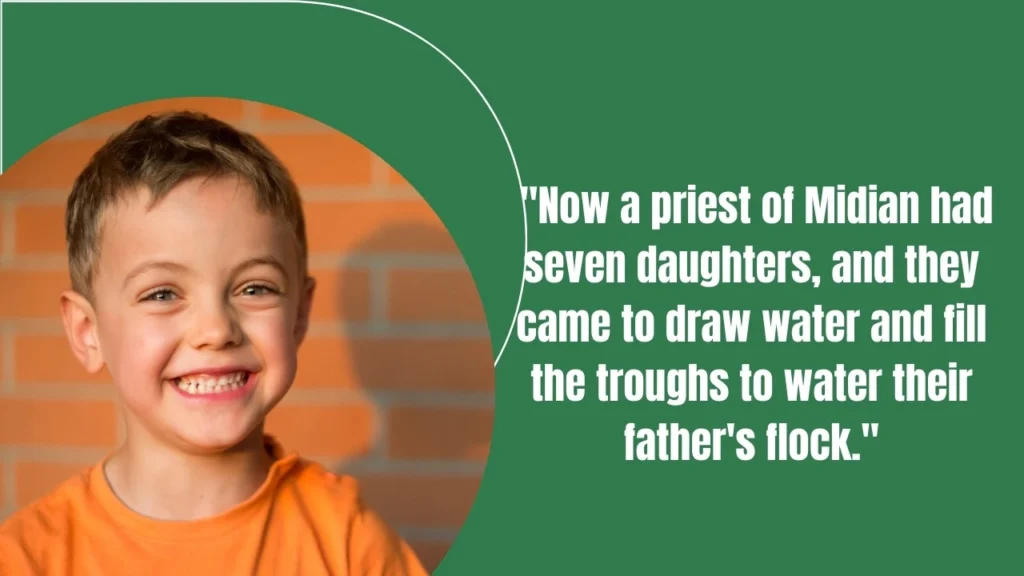145 Bible Verses about Daughters: Celebrating God’s Precious Gifts
Female children are valuable gifts by God. They bring happiness, knowledge and strength to any family. The Bible praises daughters in gorgeous verses of Scripture. This collection of 145 Bible verses on daughters demonstrates that daughters are the object of Gods love and blessings.
The Word of God respects daughters both in the old and the New Testament. These verses are very insightful whether you are in need of inspirational verses or encouragement. They demonstrate how deeply imbedded daughters are in the impeccable plan of God. if you are quotes lover and went to read more quotes than visit quotes slide.
The Divine Blessing of Daughters in Scripture
Daughters as God’s Precious Gifts
The Bible clearly shows that daughters are divine blessings. Psalm 127:3 tells us “Children are a heritage from the Lord, offspring a reward from him.” This verse shows that all children, including daughters, are gifts from God’s loving hands.
Psalm 144:12 paints a beautiful picture of daughters. It says “Then our sons in their youth will be like well-nurtured plants, and our daughters will be like pillars carved to adorn a palace.” This verse shows daughters as beautiful and strong. They are like decorated pillars that make a palace more beautiful.
The Book of Genesis shares Sarah’s joy when she became a mother. Genesis 21:6-7 records her saying “God has brought me laughter, and everyone who hears about this will laugh with me.” Sarah understood that children bring joy and laughter to families.
Deuteronomy 7:13 promises God’s blessings on families. It says “He will love you and bless you and increase your numbers. He will bless the fruit of your womb.” This shows God’s special care for mothers and their daughters.
Genesis 49:25 speaks of “blessings of the breast and womb.” These are special blessings from the Almighty God. He gives life and nurtures it with love.
Isaiah 66:13 compares God’s love to a mother’s love. “As a mother comforts her child, so will I comfort you.” This shows the special bond between mothers and daughters. It reflects God’s tender care for His people.
Ruth 4:13 tells how “the Lord enabled her to conceive, and she gave birth to a son.” This shows God’s active role in giving children to families. Every child, including daughters, comes from God’s loving plan.
Genesis 30:22-23 shares how “God remembered Rachel; he listened to her and enabled her to conceive.” God hears the prayers of mothers. He answers in His perfect time.
Job 42:13-15 tells about Job’s daughters. “Nowhere in all the land were there found women as beautiful as Job’s daughters, and their father granted them an inheritance along with their brothers.” This shows how Job valued his daughters equally with his sons.
Exodus 2:16 mentions “a priest of Midian had seven daughters.” Even this simple mention shows daughters as important parts of families in Scripture. if you went to read Bible Verses About Marriage than visit this page.
Biblical Celebrations of Daughters
The Bible records many celebrations of daughters throughout its pages. Genesis 24:60 shows a beautiful blessing given to Rebekah. “And they blessed Rebekah and said to her, ‘Our sister, may you increase to thousands upon thousands; may your offspring possess the cities of their enemies.'”
The value attached to daughters is revealed in this blessing. Rebekah gave birth to many children. Her family had a hope and a good prospect of her future.
Ruth 4:13 celebrates when Ruth became a mother. “So Boaz took Ruth and she became his wife. When he made love to her, the Lord enabled her to conceive, and she gave birth to a son.” This shows God’s hand in bringing new life.
Genesis 30:22-23 records Rachel’s joy. “Then God remembered Rachel; he listened to her and enabled her to conceive. She became pregnant and gave birth to a son and said, ‘God has taken away my disgrace.'” Children remove shame and bring honor to mothers.
The story of Job’s daughters shows special celebration. Job 42:13-15 tells us “And he also had seven sons and three daughters. The first daughter he named Jemimah, the second Keziah and the third Keren-Happuch.” These names show Job’s love and care in naming his daughters.
1 Samuel 1:20 celebrates Hannah’s answered prayer. “So in the course of time Hannah became pregnant and gave birth to a son. She named him Samuel, saying, ‘Because I asked the Lord for him.'” This shows how mothers celebrate God’s gifts of children. if you went to read about 30 Bible Verses For When You Feel Like Giving Up. than visit this page.
Parental Love and Guidance for Daughters

Godly Parenting of Daughters
The Bible gives clear guidance for parents raising daughters. Ephesians 6:4 tells fathers “do not exasperate your children; instead, bring them up in the training and instruction of the Lord.” This shows the importance of patient, godly parenting.
Proverbs 22:6 gives a famous promise. “Start children off on the way they should go, and even when they are old they will not turn from it.” This applies to daughters as well as sons. Early guidance shapes their entire lives.
Colossians 3:21 warns fathers “do not embitter your children, or they will become discouraged.” Parents must be careful not to crush their daughters’ spirits. Love and encouragement help daughters grow strong.
Proverbs 29:17 shows the results of good parenting. “Discipline your children, and they will give you peace; they will bring you the delights you desire.” Proper discipline with love brings joy to the whole family.
Isaiah 49:15 compares God’s love to a mother’s love. “Can a mother forget the baby at her breast and have no compassion on the child she has borne? Though she may forget, I will not forget you!” This shows the deep bond between mothers and daughters.
Proverbs 13:24 teaches about loving discipline. “Whoever spares the rod hates their children, but the one who loves their children is careful to discipline them.” True love includes proper discipline.
Proverbs 19:18 encourages parents to act while there is hope. “Discipline your children, for in that there is hope.” Early guidance and discipline shape daughters for good.
Proverbs 3:12 compares God’s discipline to a father’s love. “Because the Lord disciplines those he loves, as a father the son he delights in.” This shows that discipline comes from love, not anger.
Psalm 103:13 describes fatherly compassion. “As a father has compassion on his children, so the Lord has compassion on those who fear him.” Fathers should show compassion to their daughters.
Deuteronomy 4:9 emphasizes teaching children and grandchildren. “Teach them to your children and to their children after them.” Parents must pass down God’s Word to their daughters.
Wisdom and Guidance for Daughters
The Book of Proverbs contains much wisdom for daughters. Proverbs 1:8-9 says “Listen, my son, to your father’s instruction and do not forsake your mother’s teaching. They are a garland to grace your head and a chain to adorn your neck.”
This verse applies to daughters too. Parents’ teaching becomes beautiful jewelry for their children. Wisdom and instruction make daughters more beautiful.
Proverbs 2:1-5 encourages seeking wisdom. “My son, if you accept my words and store up my commands within you, turning your ear to wisdom and applying your heart to understanding… then you will understand the fear of the Lord and find the knowledge of God.”
Women who want to have knowledge must search out the knowledge of God. This is the richest prize that they can find out
Proverbs 3:1-2 promises long life to obedient children. “My son, do not forget my teaching, but keep my commands in your heart, for they will prolong your life many years and bring you peace and prosperity.”
Daughters who obey God to live a long, peaceful life. Compliance is rewarded
Proverbs 4:5-6 urges getting wisdom. “Get wisdom, get understanding; do not forget my words or turn away from them. Do not forsake wisdom, and she will protect you; love her, and she will watch over you.”
Wisdom behaves like a mother to her own girls. She preserves them to harm and gives them direction.
Proverbs 4:13 emphasizes holding onto instruction. “Hold on to instruction, do not let it go; guard it well, for it is your life.” Good teaching literally becomes life to daughters.
Proverbs 23:22 teaches respect for aging parents. “Listen to your father, who gave you life, and do not despise your mother when she is old.” Daughters must honor parents throughout their lives.
Proverbs 6:20-22 describes parents’ teaching as constant guides. “My son, keep your father’s command and do not forsake your mother’s teaching. Bind them always on your heart; fasten them around your neck. When you walk, they will guide you; when you sleep, they will watch over you; when you awake, they will speak to you.”
Good teaching from parents guides daughters day and night. It becomes their internal compass for life.
Proverbs 23:24-25 shows the joy of righteous children. “The father of a righteous child has great joy; a man who fathers a wise son rejoices in him. May your father and mother rejoice; may she who gave you birth be joyful!”
Virtuous daughters are a great source of happiness to their parents. The good decisions of wholesome family people endear them to the entire family unit
Proverbs 10:1 contrasts wise and foolish children. “A wise son brings joy to his father, but a foolish son brings grief to his mother.” Daughters who choose wisdom bring joy instead of sorrow.
Proverbs 23:15-16 expresses a father’s joy in wise children. “My son, if your heart is wise, then my heart will be glad indeed; my inmost being will rejoice when your lips speak what is right.”
Faithful Daughters Throughout Biblical History

Exemplary Daughters of Faith
The Bible records many daughters who showed great faith. Mary, the mother of Jesus, stands out as the most faithful. Luke 1:38 records her words: “I am the Lord’s servant. May your word to me be fulfilled.”
Mary obeyed willingly and this changed history She was confident that God was going to work it out even when she could not see how everything was going to be working out.
Ruth shows amazing faith and loyalty. Ruth 1:16 records her famous words: “Don’t urge me to leave you or to turn back from you. Where you go I will go, and where you stay I will stay. Your people will be my people and your God my God.”
In my view, Ruth moved out of her native country because she believed in God. She did this in order to accompany her husband Naomi and his God.
Ruth 3:10 shows how others praised Ruth’s faith. Boaz said “The Lord bless you, my daughter. This kindness is greater than that which you showed earlier: You have not run after the younger men, whether rich or poor.”
Ruth’s faith impressed everyone who knew her. Her loyalty and purity made her a perfect example.
Acts 21:9 mentions Philip’s daughters. “He had four unmarried daughters who prophesied.” These daughters served God through the gift of prophecy. They spoke God’s Word to His people.
Esther shows courage and faith in danger. Esther 2:7 describes her: “Mordecai had a cousin named Hadassah, whom he had brought up because she had neither father nor mother. This young woman, who was also known as Esther, had a lovely figure and was beautiful.”
Esther’s inner beauty matched her outer beauty. Her faith and courage saved her people.
Luke 2:36-37 tells about Anna the prophetess. “There was also a prophet, Anna, the daughter of Penuel, of the tribe of Asher. She was very old; she had lived with her husband seven years after her marriage, and then was a widow until she was eighty-four. She never left the temple but worshiped night and day, fasting and praying.”
Anna spent all of life in service to God. And had she worshiped in her old days.
1 Samuel 1:20 celebrates Hannah’s faith. “So in the course of time Hannah became pregnant and gave birth to a son. She named him Samuel, saying, ‘Because I asked the Lord for him.'”
Hannah prayers were so faithful The prayers of God made her receive Samuel.
Exodus 2:2 mentions Moses’ mother’s faith. “So the woman conceived and bore a son. And when she saw that he was a beautiful child, she hid him three months.”
Daughters in Biblical Families
The Bible shows daughters as important parts of families. Genesis 46:7 mentions Jacob’s family: “He brought with him to Egypt his sons and grandsons and his daughters and granddaughters-all his offspring.”
Daughters and grand daughters were also regarded as assets to the family. They did not end up forgotten or left behind
Numbers 27:1 introduces the daughters of Zelophehad. “The daughters of Zelophehad son of Hepher, the son of Gilead, the son of Makir, the son of Manasseh, belonged to the clans of Manasseh son of Joseph. The names of the daughters were Mahlah, Noah, Hoglah, Milkah and Tirzah.”
These five sisters were renowned because of pursuing their right of inheritance. They were courageous and appreciated the good justice of God.
Joshua 17:3 repeats their story. “Now Zelophehad son of Hepher, the son of Gilead, the son of Makir, the son of Manasseh, had no sons but only daughters, whose names were Mahlah, Noah, Hoglah, Milkah and Tirzah.”
An exclusively female family was not a disgrace to Zelophehad. His daughters became his heirs.
Job 42:13-15 describes Job’s restored family. “And he also had seven sons and three daughters. The first daughter he named Jemimah, the second Keziah and the third Keren-Happuch. Nowhere in all the land were there found women as beautiful as Job’s daughters, and their father granted them an inheritance along with their brothers.”
Job gave his daughters careful names. Jemimah, Keziah and Keren-Happuch were famous due to their beauty. More to the point, they were entitled equally as their brothers in the inheritance partierships.
Exodus 2:16 mentions Jethro’s daughters. “Now a priest of Midian had seven daughters, and they came to draw water and fill the troughs to water their father’s flock.”
Such daughters were hard workers. The children worked so hard taking care of the animals of their father.
Judges 1:14 tells about Caleb’s daughter Aksah. “One day when she came to Othniel, she urged him to ask her father for a field.”
Aksah showed wisdom in asking for land. She thought about her family’s future needs.
1 Samuel 25:44 mentions Saul’s daughter Michal. “But Saul had given his daughter Michal, David’s wife, to Paltiel son of Laish, who was from Gallim.”
Even Wicked Family dealings are recorded in Scripture with daughters. The bible gives true families with true problems.
Daughters and Marriage in Biblical Times

Biblical Perspective on Daughters and Marriage
The Bible shows marriage as an important part of daughters’ lives. Genesis 24:51 records Abraham’s servant arranging Rebekah’s marriage. “Here is Rebekah; take her and go, and let her become the wife of your master’s son, as the Lord has directed.”
This demonstrates that families were attentive about marriage planning their daughters. They consulted God in these major decisions.
Genesis 29:28 tells how Jacob received Rachel in marriage. “And Jacob did so. He finished the week with Leah, and then Laban gave him his daughter Rachel to be his wife.”
Fathers had their daughters married to good men. It was a festive and joyous period.
Exodus 2:21 describes Moses’ marriage to Zipporah. “Moses agreed to stay with the man, who gave his daughter Zipporah to Moses in marriage.”
Jethro sent his daughter Zipporah to Moses to trust in him. This union was blessed to the families
1 Samuel 18:27 tells how David earned Saul’s daughter in marriage. “David took his men with him and went out and killed two hundred Philistines and brought back their foreskins. They counted out the full number to the king so that David might become the king’s son-in-law. Then Saul gave him his daughter Michal in marriage.”
David had to demonstrate his merits to win Michal to become his wife. He was a fearless warrior.
Joshua 15:17 describes Caleb giving his daughter Aksah in marriage. “Othniel son of Kenaz, Caleb’s brother, took it; so Caleb gave his daughter Aksah to him in marriage.”
Othniel rewarded with a wife called Aksah because of his courage motivated Caleb to give him his daughter as bride. Honor and achievement were also rolled into marriage.
Genesis 34:9 mentions marriage customs. “Intermarry with us; give us your daughters and take our daughters for yourselves.”
The tradition of marriage was what connected families and tribes. Daughters were critical in expecting such relationships.
1 Samuel 25:42 tells how Abigail became David’s wife. “Abigail quickly got on a donkey and, attended by her five female servants, went with David’s messengers and became his wife.”
Abigail was already married but was widowed and David married her. David found her wise and beautiful.
Genesis 28:9 mentions Esau’s marriage to Mahalath. “So he went to Ishmael and married Mahalath, the sister of Nebaioth and daughter of Ishmael son of Abraham, in addition to the wives he already had.”.
Honor and Protection of Daughters
Fathers in the Bible worked to protect and honor their daughters. Genesis 31:50 shows Laban’s concern for his daughters. “If you mistreat my daughters or if you take any wives besides my daughters, even though no one is with us, remember that God is a witness between you and me.”
Laban appealed to God to serve as a guarantor of his daughters. He did not want them to be treated as pets but like loved ones.
2 Samuel 14:27 mentions Absalom’s beautiful daughter. “Three sons and a daughter were born to Absalom. His daughter’s name was Tamar, and she became a beautiful woman.”
Absalom named his daughter Tamar after his sister. He honored her memory through his daughter’s name.
1 Kings 4:11 mentions Solomon’s daughters in marriage. “Ben–Abinadab-in Naphoth Dor (he was married to Taphath daughter of Solomon).”
These daughters of Solomon were wifed to high officials Such marriages gave the two families pride.
1 Kings 4:15 mentions another of Solomon’s daughters. “Ahimaaz-in Naphtali (he had married Basemath daughter of Solomon).”
Solomon sensibly married his daughters off to his trusting officials.
2 Kings 8:18 warns about bad marriage choices. “He followed the ways of the kings of Israel, as the house of Ahab had done, for he married a daughter of Ahab. He did evil in the eyes of the Lord.”
Evil influence came with some marriages Parents were simple in selecting husbands to their daughters.
2 Chronicles 11:18 describes Rehoboam’s marriage. “Rehoboam married Mahalath, who was the daughter of David’s son Jerimoth and of Abihail the daughter of Jesse’s son Eliab.”
Daughters and Divine Purpose

Daughters in Prophecy and God’s Plan
The Bible includes daughters in God’s prophetic plans. Isaiah 62:11 speaks to “Daughter Zion.” “The Lord has made proclamation to the ends of the earth: ‘Say to Daughter Zion, See, your Savior comes! See, his reward is with him, and his recompense accompanies him.'”
Daughter Zion symbolizes Gods people awaiting salvation. This portrays daughters in the great plan of redemption by God.
Zechariah 9:9 calls Daughter Zion to rejoice. “Rejoice greatly, Daughter Zion! Shout, Daughter Jerusalem! See, your king comes to you, righteous and victorious, lowly and riding on a donkey, on a colt, the foal of a donkey.”
This came to pass when Jesus rode to Jerusalem. Daughters of Zion were invited to be happy with their king.
Joel 2:28 includes daughters in God’s future plans. “And afterward, I will pour out my Spirit on all people. Your sons and daughters will prophesy, your old men will dream dreams, your young men will see visions.”
God promises that daughters will have to receive His Spirit. They will prophesy with their brothers
Jeremiah 6:2 calls Daughter Zion beautiful and delicate. “I will destroy Daughter Zion, so beautiful and delicate.”
Even in judgment, God sees the beauty of His people represented as daughters.
Isaiah 10:32 mentions Daughter Zion as God’s holy mountain. “This very day he will halt at Nob; he will shake his fist at the mount of Daughter Zion, at the hill of Jerusalem.”
Daughter Zion is the holy city and choosen people of God.
Isaiah 37:22 shows Daughter Zion’s confidence in God. “This is the word the Lord has spoken against him: ‘Virgin Daughter Zion despises and mocks you. Daughter Jerusalem tosses her head as you flee.'”
Pure and strong is the Virgin Daughter Zion. She is never afraid of her enemies since God guards her heart together with her whole body to stop the invasion of her enemies to enter the path of her feet.
Lamentations 2:13 shows God’s compassion for Daughter Jerusalem. “What can I say for you? With what can I compare you, Daughter Jerusalem? To what can I liken you, that I may comfort you, Virgin Daughter Zion? Your wound is as deep as the sea. Who can heal you?”
In grief too, God tries to console his people pictured as daughters.
Lamentations 4:22 promises an end to punishment. “Your punishment will end, Daughter Zion; he will not prolong your exile. But he will punish your sin, Daughter Edom, and expose your wickedness.”
God restrains the punishment of Daughter Zion. His mercy knoweth its limit
Micah 4:10 speaks of Daughter Zion’s future redemption. “Writhe in agony, Daughter Zion, like a woman in labor, for now you must leave the city to camp in the open field. You will go to Babylon; there you will be rescued. There the Lord will redeem you out of the hand of your enemies.”
Daughter Zion will be like a woman in labour: she will be agonised but then exulting. God will salvage and save his people.
Jeremiah 4:31 compares Daughter Zion to a woman in labor. “I hear a cry as of a woman in labor, a groan as of one bearing her first child-the cry of Daughter Zion gasping for breath, stretching out her hands and saying, ‘Alas! I am fainting; my life is given over to murderers.'”
This shows the intense suffering God’s people sometimes face. But like childbirth, the pain leads to new life.

Daughters as Healers and Ministers
Jesus showed special care for daughters throughout the Gospels. Mark 5:34 records His healing words: “He said to her, ‘Daughter, your faith has healed you. Go in peace and be freed from your suffering.'”
Jesus called the sick woman “Daughter.” This showed His tender love and care. Her faith brought healing.
Mark 5:41 shows Jesus raising a young girl from death. “He took her by the hand and said to her, ‘Talitha koum!’ (which means ‘Little girl, I say to you, get up!’).”
Jesus gently took the dead girl’s hand. His touch brought life back to her body.
Luke 8:48 repeats the story of healing through faith. “Then he said to her, ‘Daughter, your faith has healed you. Go in peace.'”
It was Jesus who stressed that also the woman was healed by her faith. Daughters can be of great faith which stirs the heart of God.
Acts 9:40 tells how Peter raised Tabitha from death. “Peter sent them all out of the room; then he got down on his knees and prayed. Turning toward the dead woman, he said, ‘Tabitha, get up.’ She opened her eyes, and seeing Peter she sat up.”
Abitha was reputed as an assistant. God brought her back to life in order to resume her ministry.
Acts 16:18 shows Paul setting a girl free from evil spirits. “She kept this up for many days. Finally Paul became so annoyed that he turned around and said to the spirit, ‘In the name of Jesus Christ I command you to come out of her!’ At that moment the spirit left her.”
Paul invoked the name of Jesus to deliver the girl of spiritual slavery. Daughters require protection of God against evil.
Matthew 8:15 tells about Peter’s mother-in-law being healed. “He touched her hand and the fever left her, and she got up and began to wait on him.”
And, upon his recovery, she at once set about administering to others. Healing results to ministry and service.
Mark 7:29 shows healing through a mother’s faith. “Then he told her, ‘For such a reply, you may go; the demon has left your daughter.'”
A mothers faith healed her daughter. The prayers of parents are able to introduce the power of God into the lives of their daughters Figaro.
Daughters and Spiritual Inheritance
Daughters Receiving God’s Inheritance
The Bible shows that daughters can receive inheritance just like sons. Numbers 27:7 records God’s judgment: “What Zelophehad’s daughters are saying is right. You must certainly give them property as an inheritance among their father’s relatives and give their father’s inheritance to them.”
God supported the daughters of Zelophehad. He said variously that their petition was just and right to inheritance.
Numbers 27:8 established a new law. “Say to the Israelites, ‘If a man dies and leaves no son, give his inheritance to his daughter.'”
This law saved daughters who did not have brothers God made sure that they would not be left wanting sustenance
Numbers 36:2 shows the community supporting this decision. “They said, ‘When the Lord commanded my lord to give the land as an inheritance to the Israelites by lot, he ordered you to give the inheritance of our brother Zelophehad to his daughters.'”
The entire community was aware of the God command regarding daughters inheritance right
Numbers 36:10 shows the daughters’ obedience. “So Zelophehad’s daughters did as the Lord commanded Moses.”
These daughters followed God’s commands about their inheritance. They married within their tribe to keep the land in the family.
Joshua 17:4 shows the daughters claiming their inheritance. “They went to Eleazar the priest, Joshua son of Nun, and the leaders and said, ‘The Lord commanded Moses to give us an inheritance among our relatives.’ So Joshua gave them an inheritance along with the brothers of their father, according to the Lord’s command.”
These courageous daughters responded to their lives. They also served a reminder to the leaders of the command of God that got their inheritance.
Job 42:15 shows a father giving his daughters equal inheritance. “Nowhere in all the land were there found women as beautiful as Job’s daughters, and their father granted them an inheritance along with their brothers.”
Job had given inheritance to daughters just like his sons. This was a strange but loving and wise act.
1 Chronicles 2:34-35 shows daughters continuing family lines. “Sheshan had no sons-only daughters. He had an Egyptian servant named Jarha. Sheshan gave his daughter in marriage to his servant Jarha, and she bore him Attai.”
When there were no sons, daughters reproduced the family. Their children survived the name of the family
Ezra 2:61 mentions daughters in genealogical records. “And from among the priests: The descendants of Hobaiah, Hakkoz and Barzillai (a man who had married a daughter of Barzillai the Gileadite and was called by that name).”

Daughters of Priests and Spiritual Leaders
Daughters of priests had special rules and privileges. Leviticus 21:9 shows the high standard expected. “If a priest’s daughter defiles herself by becoming a prostitute, she disgraces her father; she must be burned in the fire.”
The daughters of priests were put under greater expectations. They acted like their fathers and God.
Leviticus 22:12 explains marriage rules for priests’ daughters. “If a priest’s daughter marries anyone other than a priest, she may not eat any of the sacred contributions.”
Marriage with those of non priestly descent were deprived of certain privileges This guarded the sanctity of sanctuary gifts.
Leviticus 22:13 shows compassion for priests’ daughters in trouble. “But if a priest’s daughter becomes a widow or is divorced, yet has no children and she returns to live in her father’s household as in her youth, she may eat her father’s food.”
God made available priests daughters who were needy. They were in a position to go back home and be fed.
2 Chronicles 22:11 tells about Jehosheba, a priest’s daughter who saved a life. “But Jehosheba, the daughter of King Jehoram, took Joash son of Ahaziah and stole him away from among the royal princes who were about to be murdered and put him and his nurse in a bedroom. Because Jehosheba, the daughter of King Jehoram and wife of the priest Jehoiada, was Ahaziah’s sister, she hid the child from Athaliah so she could not kill him.”
Jehosheba was a priest as well, being a married women. She does not spare the royal house of David.
Ezekiel 44:25 shows special rules for priests. “A priest must not defile himself by going near a dead person, however, if the dead person was his father or mother, son or daughter, brother or unmarried sister, then he may defile himself.”
Priests could break purity rules only for close family members, including daughters. This shows the special bond between fathers and daughters.
1 Samuel 2:20 shows Eli blessing Hannah. “Eli would bless Elkanah and his wife, saying, ‘May the Lord give you children by this woman to take the place of the one she prayed for and gave to the Lord.’ Then they would go home.”
**







